See Also
- Bismarck Monument (Hamburg), memorial statue in Hamburg
- Bismarck monument, monuments of Otto von Bismarck
Bismarck Memorial may refer to:
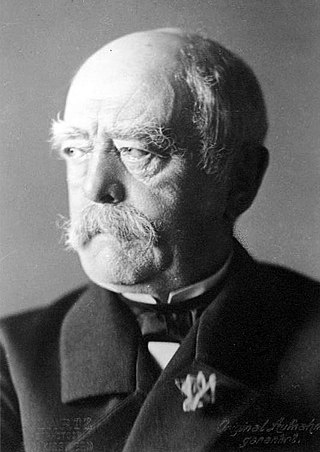
Otto, Prince of Bismarck, Count of Bismarck-Schönhausen, Duke of Lauenburg was a Prussian statesman and diplomat who oversaw the unification of Germany. Bismarck's Realpolitik and firm governance resulted in him being popularly known as the Iron Chancellor.
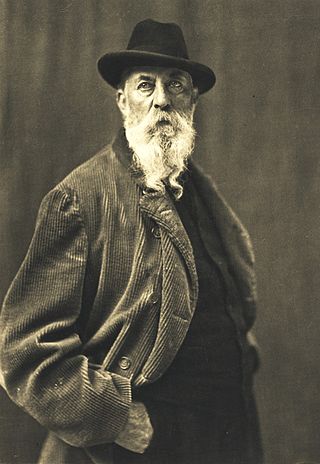
Reinhold Begas was a German sculptor.

The Bismarck Memorial is a prominent memorial statue in the Tiergarten in Berlin dedicated to Prince Otto von Bismarck, Minister President of the Kingdom of Prussia and the first Chancellor of the German Empire. It was sculpted by Reinhold Begas and unveiled in 1901.

The Soviet War Memorial is a war memorial and military cemetery in Berlin's Treptower Park. It was built to the design of the Soviet architect Yakov Belopolsky to commemorate 7,000 of the 80,000 Red Army soldiers who fell in the Battle of Berlin in April–May 1945. It opened four years after the end of World War II in Europe, on 8 May 1949. The Memorial served as the central war memorial of East Germany.

The Soviet War Memorial is one of several war memorials in Berlin, the capital city of Germany, erected by the Soviet Union to commemorate its war dead, particularly the 80,000 soldiers of the Soviet Armed Forces who died during the Battle of Berlin in April and May 1945.
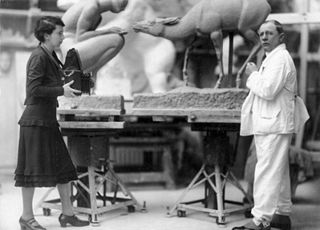
Professor Hugo Lederer was an Austro-Hungarian-born German sculptor.

The Bismarck Monument in Hamburg is a memorial sculpture located in the St. Pauli quarter dedicated to Otto von Bismarck. It is one of 240 memorials to Bismarck worldwide and is the largest and probably best-known of these Bismarck towers. The monument stands near the jetties of Hamburg port on the Elbhöhe, today a local recreation area. The architect was Johann Emil Schaudt; the sculptor was Hugo Lederer.

Adolf von Donndorf was a German sculptor.
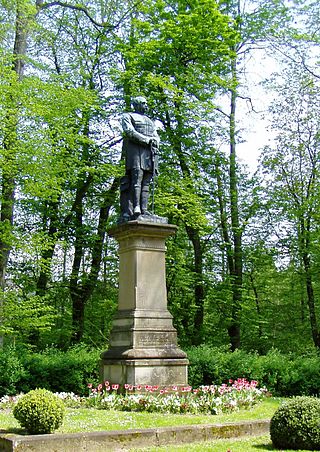
From 1868 onwards, Bismarck monuments were erected in many parts of the German Empire in honour of the long-serving Prussian minister-president and first German Reichskanzler, Prince Otto von Bismarck. Today some of these monuments are on the soil of other countries including France, Poland and Russia as well as the former German colonies on other continents.

A large number of monuments were erected in Germany in honour of Emperor William I. As early as 1867 the Berlin sculptor, Friedrich Drake, had created the first equestrian statue, that portrayed William I as the King of Prussia. To date the Prussian Monument Institute has recorded:

The National Kaiser Wilhelm Monument (Kaiser-Wilhelm-Nationaldenkmal) was a memorial structure in Berlin dedicated to Wilhelm I, first Emperor of Imperial Germany. It stood in front of the Berlin Palace from 1897 to 1950, when both structures were demolished by the German Democratic Republic (GDR) government.

Georg Wrba was a German sculptor and graphic artist. He created some 3,000–4,000 works, including as a collaborator of the Zwinger workshop.

Joseph Johann Ludwig Uphues was a German sculptor.

Frank Meisler was an Israeli architect and sculptor. Meisler was born in the Free City of Danzig and grew up in England, before moving to Israel in 1956. In 1953 he married Batya (Phillis) Hochman with whom he had 2 daughters: Michal Meisler Yehuda and Marit Meisler. He died in Jaffa in 2018.
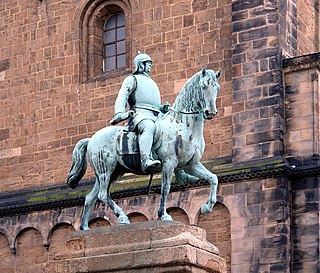
The Bismarck monument outside the cathedral in Bremen is a bronze figure of the former Chancellor, riding a horse. It was created in 1910, twelve years after Bismarck's death. The commission was entrusted to Adolf von Hildebrand in 1904. Since 1973 the monument has enjoyed protected status.
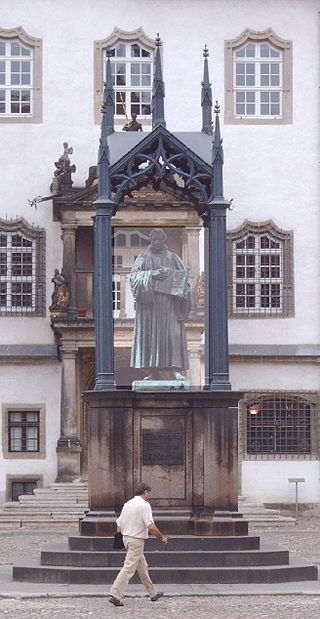
A Luther Monument is a monument dedicated to the reformer Martin Luther. The oldest one from 1821 is in Wittenberg. The largest one, the Luther Monument in Worms, was unveiled in 1868 as a composition of several statues, designed by Ernst Rietschel. Several monuments in the United States use a copy of Rietschel's main statue, including the Luther Monument in Washington, D.C., from 1884.
Ferdinand Lepcke was a German sculptor, who in particular realized two major monuments in Bydgoszcz: the Deluge Fountain and The Archer. He received a golden medal at the Great Berlin Art Exhibition and, the Berlin Minister for Spiritual Education and Medical Affairs awarded him the title of professor.